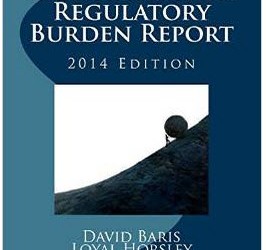AABD Reports on Overwhelming Regulatory Burdens on America’s Bank Directors

WASHINGTON, D.C. (September 3, 2014) – The American Association of Bank Directors (AABD) yesterday submitted comments to the Nation’s federal bank regulatory agencies (viz., the Office of the Comptroller of the Currency, Federal Reserve Board and Federal Deposit Insurance Corporation) regarding their Notice for comment on their planned review of regulations to identify outdated, unnecessary or unduly burdensome regulations on depository institutions. The review is required by section 2222 of the Economic Growth and Regulatory Paperwork Reduction Act of 1996 (“EGRPRA”). AABD’s comments are based upon the results of its recently concluded review of federal banking laws, regulations and written guidance entitled “Bank Director Regulatory Burden Report.”
“In their first decennial review in 2006, the Agencies failed to reduce the overwhelming regulatory burdens on bank directors, and since then, have only added to those burdens,” said David Baris, President of AABD. “The Agencies’ Notice is infirm and does not give us much hope that the second decennial review results will be any better.”
“The Notice doesn’t address the huge number of regulatory guidance enforced by the Agencies as if they are statutes or regulations,” Rich Whiting, AABD’s Executive Director, said. “Noncompliance with regulatory guidance is cited in reports of examination alongside violations of statutes and regulations, and if the agency believes regulatory guidance noncompliance constitutes unsafe or unsound banking practices, it will use its enforcement powers against banks and members of their boards of directors.”
AABD’s Bank Director Regulatory Burden Report found a “numbing” litany of laws, regulations and guidance that in the aggregate create huge burdens on bank directors. AABD estimates that there are in excess of eight hundred federal banking laws, regulations and guidance provisions that impose separate responsibilities on bank boards of directors. There are 143 such explicit statutory provisions, over 150 regulatory requirements spread out in the OCC, FDIC and FRB rule books and a huge number of guidance issuances applicable to the boards of directors of depository institutions and their parent companies. AABD’s review does not take into account burdens of the boards of state-chartered institutions from state pronouncements.
“The effect of this morass of laws, regulations and guidance in the aggregate is to create a huge and counterproductive impact on bank directors that causes them to divert their attention away from the essential job of being a bank director – that is meeting their duty of care and loyalty by overseeing the institution.” Baris said. “Instead, many of these regulatory requirements cause board members to devote time to matters that should be properly delegated to management.”
To address the concerns stemming from the overwhelming and increasing regulatory burdens facing bank directors, AABD made several recommendations to the federal banking agencies. Among them are:
- The agencies should review their current regulations and written guidance to determine the overall impact on bank directors;
- The agencies should incorporate into their procedures a requirement that future regulatory actions consider the impact of proposed rules and guidance on bank directors and not add new burdens unless the benefits of the proposed action clearly outweighs the burdens place on bank directors;
- Provisions placing burdens on bank directors, whether in statute, regulation or regulatory guidance, should be specifically identified, consolidated and clarified;
- Federal banking agencies should adopt rules to recognize that boards of directors may delegate management duties to management and rely reasonably on management.
A complete copy of AABD’s comment letter to the federal agencies is on its web site (www.aabd.org) and copies of its 2014 publication, “Bank Director Regulatory Burden Report,” are available on Amazon.
Founded in 1989, the non-profit American Association of Bank Directors is the only trade group in the United States solely devoted to bank directors and their information, education, and advocacy needs. AABD recently established the Bank Director Liability Resource Center, which acts as a clearinghouse for developments in bank director liability, including lawsuits by FDIC against directors of failed banks and savings institutions. The Institute for Bank Director Education, established in 1993 as the educational arm of AABD, acts as a clearinghouse for education programs designed for bank and savings institution directors that support the nationally recognized Director Certification Program. Visit AABD online at: http://aabd.wpengine.com.


